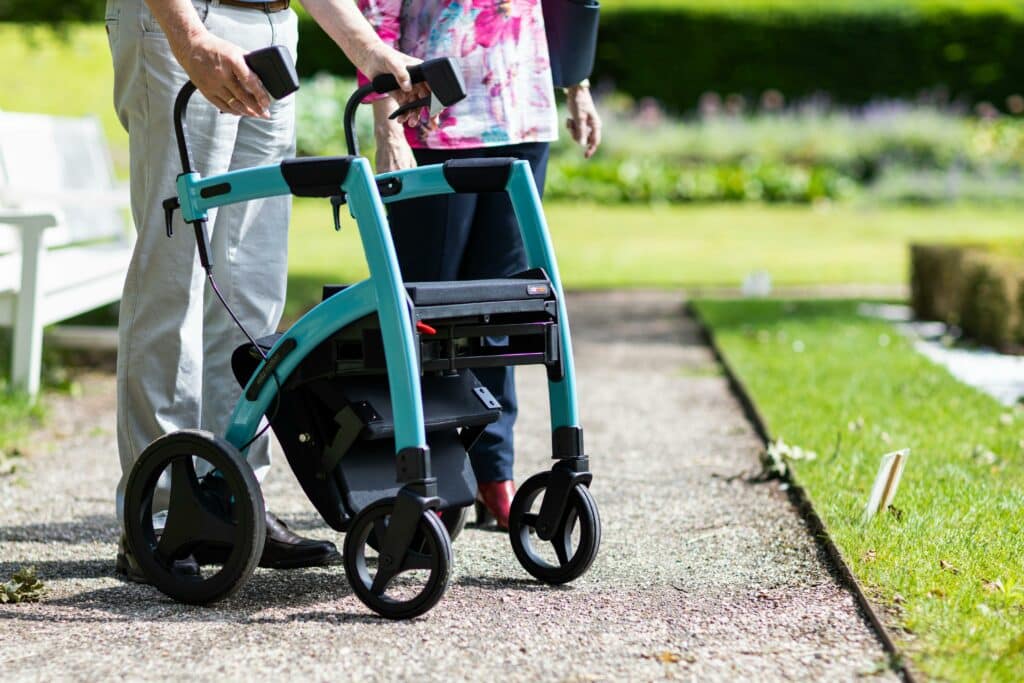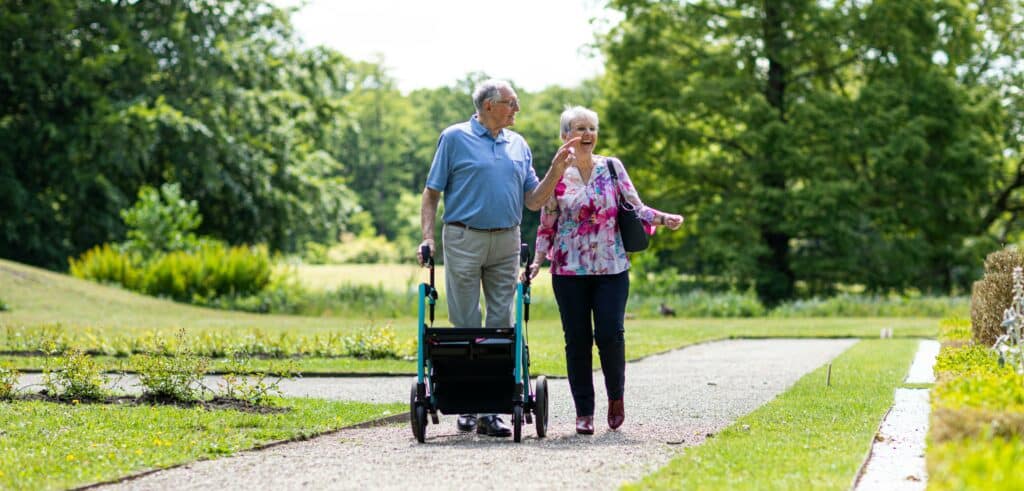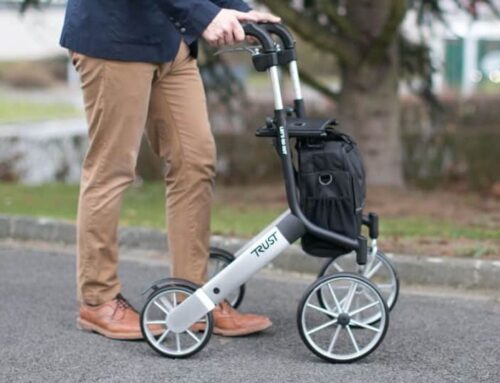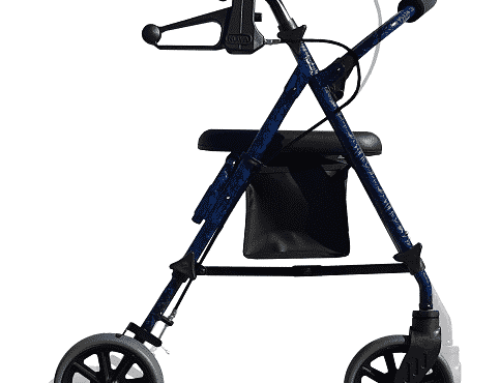Enhancing Mobility with Rollators: A Comprehensive Guide for Caregivers
Learn how to support your loved one in using a rollator effectively with our comprehensive guide. Discover the key to easier, safer walks with your loved one—unlock our expert rollator tips now! As Australia’s trusted provider of mobility aids, Able Me, located in Bentleigh, Melbourne, is here to ensure you have all the information and support you need to enhance your loved one’s mobility and independence.
What is a Rollator and How Can It Help Your Loved One?

A rollator is more than just a walking aid; it’s a tool that enhances the mobility and independence of seniors or individuals with physical limitations. Typically featuring a frame with three or four wheels, a seat, and handlebars, rollators offer stability and support for those who find walking challenging.
Rollators: Enhancing Independent Living
By using a rollator, your loved one can maintain an active lifestyle while minimizing the risk of falls. This aid is essential for preserving the dignity and independence of the elderly, making it a vital aspect of senior care.
Types of Rollators
When exploring rollators, you’ll encounter various types, each tailored to specific needs:
Indoor vs. Outdoor Rollators
- Indoor Rollators: Designed for maneuverability in narrow spaces.
- Outdoor Rollators: Equipped with larger wheels for rough terrain and more robust frames.
Specialty Rollators
- Lightweight Rollators: Ideal for those with limited strength.
- Heavy-Duty Rollators: Suited for larger individuals, offering wider seats and enhanced support.
- Bariatric Rollators: Designed for individuals who require a sturdier frame and increased weight capacity. They often feature wider seats and reinforced frames.
- Posture Control Rollators: These are engineered to encourage a more upright posture, reducing the risk of back and shoulder strain.
- Compact Rollators: Ideal for those who travel frequently or have limited storage space. These rollators are lightweight and fold easily.
- Pediatric Rollators: Specially designed for children, these rollators are adjustable and come in various attractive designs to encourage usage.
- Hemi Rollators: For users with limited or no use of one hand or arm, hemi rollators offer one-handed operation and control.
How to Choose the Right Rollator for Your Loved One
Selecting the right rollator involves considering several factors to ensure it meets the specific needs of your loved one. Here’s what to look for:
- Assessing Mobility Needs: Determine the level of support required based on your loved one’s physical condition and balance.
- Comfort and Adjustability: Look for rollators with adjustable handle heights and comfortable seating options.
- Environment Suitability: Consider where the rollator will be primarily used (indoors, outdoors, or both) and choose a model with appropriate wheel size and tread.
- Ease of Use: Ensure the rollator is easy to maneuver, with simple brakes and folding mechanisms.
- Additional Features: Consider rollators with added features like baskets for carrying personal items, cup holders, and trays for convenience.
- Consulting Healthcare Professionals: Seek advice from a physiotherapist or occupational therapist for a recommendation tailored to your loved one’s needs.

How to Teach Your Loved One to Use a Rollator Safely
Teaching your loved one to use a rollator safely is crucial for their independence and well-being. Here are detailed steps and tips:
- Proper Adjustment: Start by adjusting the rollator’s height so that the handles align with the user’s hip joint. This ensures a natural arm position.
- Posture: Encourage standing upright with a slight bend in the elbows while holding the handles.
- Stepping Inside the Frame: Teach them to step into the frame to avoid pushing the rollator too far forward, which can lead to instability.
- Brake Usage: Show how to use the brakes properly, especially when sitting down or standing up from the rollator’s seat.
- Turning Techniques: Practice slow and steady turns to maintain balance and avoid sharp maneuvers.
- Navigating Obstacles: Train on how to approach curbs and thresholds safely, using the rollator for support.
- Regular Practice: Encourage daily practice in a safe environment to build confidence and proficiency.
Tips for Caregivers of People Using Rollators
Caring for someone who uses a rollator involves more than just physical assistance; it’s about understanding their needs and empowering them to maintain their independence. Here are some detailed tips:
- Patience and Encouragement: Understand that adapting to a rollator can be a gradual process. Offer encouragement and allow your loved one to set their own pace.
- Safety Checks: Regularly inspect the rollator for any signs of damage or wear, especially the brakes and wheels. Ensure that the rollator is always in optimal condition for safe use.
- Education on Rollator Use: Educate yourself about the specific model of rollator being used. Understand its features, limitations, and the best ways to utilize its benefits.
- Promoting Correct Usage: Gently remind your loved one to use the rollator correctly. This includes maintaining good posture, properly adjusting the handle height, and using the seat for breaks.
- Supporting Independence: Encourage your loved one to use the rollator independently wherever safe to do so. This nurtures their sense of autonomy.
- Home Care Strategies: Arrange the living space to accommodate the rollator, ensuring wide enough pathways and removing tripping hazards.
- Physical Therapy for Seniors: Collaborate with healthcare professionals to integrate appropriate exercises that complement rollator use and enhance mobility.
- Emotional Support: Recognize the emotional challenges your loved one may face and provide a listening ear and empathetic support.
- Educational Resources: Utilize disability aid resources to stay informed about new developments and strategies in elderly care and mobility aids.
- Community Engagement: Help your loved one stay connected with community support groups for individuals using mobility aids.
Common Mistakes to Avoid When Helping Someone Use a Rollator
Avoiding these common mistakes can enhance the safety and effectiveness of rollator use:
- Pushing the Rollator Too Far Ahead: This compromises balance. Encourage your loved one to keep the rollator close to maintain stability.
- Ignoring Posture: Remind them to walk upright to avoid back and shoulder strain.
- Neglecting Maintenance: Regularly check the rollator for any signs of wear or damage, especially the brakes and wheels.
- Over Assistance: Avoid doing everything for your loved one. Allow them to use the rollator independently as much as possible to maintain their strength and confidence.
- Improper Adjustment of the Rollator: Ensure that the rollator is adjusted to the correct height to prevent stooping or stretching.
- Underestimating Physical Limitations: Be mindful of your loved one’s physical limits and avoid encouraging them to overexert themselves.
- Ignoring the Terrain: Be cautious of uneven surfaces or obstacles when outdoors, as they can pose a risk for rollator users.
Activities to Do with Your Loved One Who Uses a Rollator

Engaging in activities together can significantly improve the well-being of your loved one. Here are some suggestions:
- Short Walks in Nature: Enjoy the outdoors and get some fresh air. Choose flat, rollator-friendly paths for ease of mobility.
- Social Outings: Attend community events, visit friends, or go to local cafes, ensuring that the venues are accessible with a rollator.
- Physical Therapy Exercises: Work with a therapist to incorporate exercises that are safe to perform with a rollator, enhancing strength and balance.
- Gardening: Engage in light gardening activities, using the rollator for support and stability.
- Shopping Trips: Use the rollator on shopping trips, utilizing the built-in seat for rest periods.
- Arts and Crafts: Set up a comfortable space where your loved one can enjoy arts and crafts while seated in their rollator.
- Participation in Local Senior Centers: Many centers offer programs specifically designed for individuals with mobility aids.
- Home Exercise Routines: Create a safe exercise routine at home, using the rollator for support and balance.
- Visits to Parks and Museums: Choose accessible locations where your loved one can stroll at their own pace.
- Photography Walks: Encourage your loved one to take photos during your walks as a way to engage creatively with their surroundings.
Rollators: Promoting Independence and Quality of Life for Loved Ones
In conclusion, assisting a loved one with a rollator requires patience, understanding, and the right knowledge. By following these guidelines, you can ensure they enjoy a higher quality of life and independence. For more information on rollators and other mobility aids, visit Able Medilink in Bentleigh, Melbourne, or explore our online store for a range of options suited to your needs.
We welcome your questions and experiences – share your stories and contact us for personalized advice and support. Together, we can make mobility a comfortable and safe journey for your loved ones.







